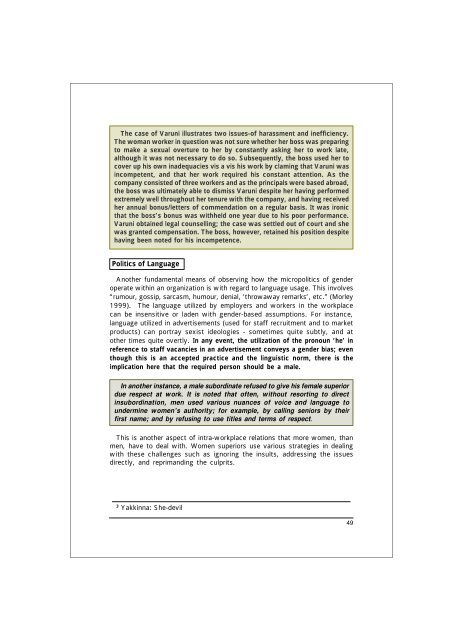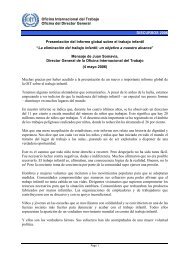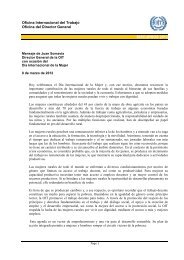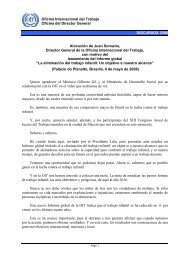Beyond Glass Ceilings and Brick Walls - International Labour ...
Beyond Glass Ceilings and Brick Walls - International Labour ...
Beyond Glass Ceilings and Brick Walls - International Labour ...
Create successful ePaper yourself
Turn your PDF publications into a flip-book with our unique Google optimized e-Paper software.
The case of Varuni illustrates two issues-of harassment <strong>and</strong> inefficiency.<br />
The woman worker in question was not sure whether her boss was preparing<br />
to make a sexual overture to her by constantly asking her to work late,<br />
although it was not necessary to do so. Subsequently, the boss used her to<br />
cover up his own inadequacies vis a vis his work by claming that Varuni was<br />
incompetent, <strong>and</strong> that her work required his constant attention. As the<br />
company consisted of three workers <strong>and</strong> as the principals were based abroad,<br />
the boss was ultimately able to dismiss Varuni despite her having performed<br />
extremely well throughout her tenure with the company, <strong>and</strong> having received<br />
her annual bonus/letters of commendation on a regular basis. It was ironic<br />
that the boss’s bonus was withheld one year due to his poor performance.<br />
Varuni obtained legal counselling; the case was settled out of court <strong>and</strong> she<br />
was granted compensation. The boss, however, retained his position despite<br />
having been noted for his incompetence.<br />
Politics of Language<br />
Another fundamental means of observing how the micropolitics of gender<br />
operate within an organization is with regard to language usage. This involves<br />
“rumour, gossip, sarcasm, humour, denial, ‘throwaway remarks’, etc.” (Morley<br />
1999). The language utilized by employers <strong>and</strong> workers in the workplace<br />
can be insensitive or laden with gender-based assumptions. For instance,<br />
language utilized in advertisements (used for staff recruitment <strong>and</strong> to market<br />
products) can portray sexist ideologies - sometimes quite subtly, <strong>and</strong> at<br />
other times quite overtly. In any event, the utilization of the pronoun ‘he’ in<br />
reference to staff vacancies in an advertisement conveys a gender bias; even<br />
though this is an accepted practice <strong>and</strong> the linguistic norm, there is the<br />
implication here that the required person should be a male.<br />
In another instance, a male subordinate refused to give his female superior<br />
due respect at work. It is noted that often, without resorting to direct<br />
insubordination, men used various nuances of voice <strong>and</strong> language to<br />
undermine women’s authority; for example, by calling seniors by their<br />
first name; <strong>and</strong> by refusing to use titles <strong>and</strong> terms of respect.<br />
This is another aspect of intra-workplace relations that more women, than<br />
men, have to deal with. Women superiors use various strategies in dealing<br />
with these challenges such as ignoring the insults, addressing the issues<br />
directly, <strong>and</strong> reprim<strong>and</strong>ing the culprits.<br />
3<br />
Yakkinna: She-devil<br />
49
















